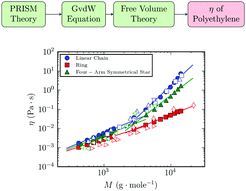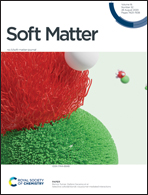Prediction of crossover in the molecular weight dependence of polyethylene viscosity using a polymer free volume theory†
Abstract
Based upon the Doolittle concept that viscosity and free volume are inversely related, we used the Boltzmann equation along with a polymer free volume theory to calculate the viscosity (η) of polyethylene with three different molecular structures – linear, ring and four-arm symmetrical star – over a molecular weight (M) range of 420–14 000 g mol−1. Free volume parameters were estimated using the Polymer Reference Interaction Site Model (PRISM) and generic van der Waals (GvdW) equation. The polymer free volume theory was able to describe the crossovers in the molecular weight dependence of the viscosity of the aforementioned molecular structures. In particular, the crossover for the linear structure was predicted at about 3000 g mole−1 with η ∼ M1.5 in the unentangled regime and η ∼ M3.3 in the entangled regime that agree reasonably well with experiment. The predictions for the other two structures also agree with the available simulation data. We also demonstrated that the accuracy of the viscosity prediction was sensitive to the difference between two free volume parameters (i.e., (ϕ+ − F)). Here, F signifies the probability of a bead finding free volume greater than the critical free volume while the fraction of such beads (ϕ+) can be used to calculate the activation energy. The theory also reproduced the temperature dependence of η for the linear structure at different M, giving apparent activation energy (Eappa) values in the range of 5.30–7.70 kcal mole−1 that are in good agreement with experimental values of 5.50–6.75 kcal mole−1. This work demonstrates for the first time that viscosity of polymer melts can be determined from the polymer free volume theory.



 Please wait while we load your content...
Please wait while we load your content...